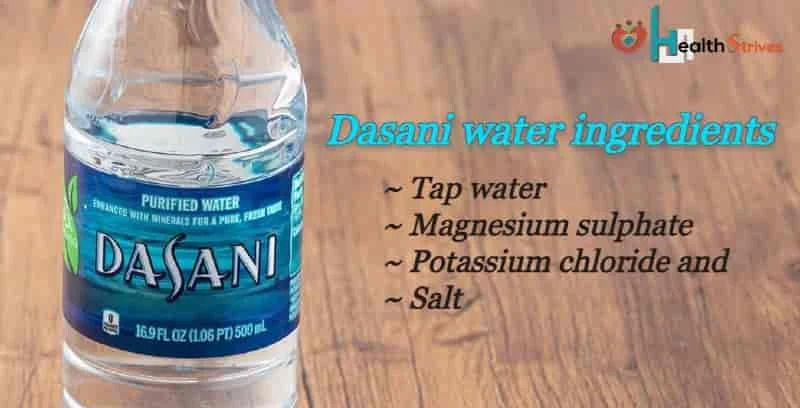Demystifying Dasani Water Ingredients: A Deep Dive into Purity and Transparency

Dasani, a renowned bottled water brand under The Coca-Cola Company umbrella, has become a staple in the world of hydration. As consumer awareness about product ingredients grows, there's an increasing curiosity about what goes into popular bottled waters like Dasani. In this comprehensive exploration, we will dissect Dasani water ingredients, unraveling the composition, the brand's dedication to transparency, and the potential impact on health.
The Composition of Dasani Water
Dasani prides itself on offering "purified water with minerals." Let's break down the key components that make up Dasani water:
-
Purified Water:
- The fundamental ingredient in Dasani water is purified water. This is achieved through a multi-step process involving reverse osmosis, activated carbon filtration, and UV light exposure. These steps collectively remove impurities, contaminants, and minerals, ensuring a clean and crisp drinking experience.
-
Magnesium Sulfate:
- Dasani introduces magnesium sulfate into its water. This mineral, found in nature, is not only added for taste enhancement but also contributes to the overall mineral content of the water. Magnesium is an essential nutrient with various health benefits.
-
Potassium Chloride:
- Potassium chloride is another mineral incorporated into Dasani water, serving to balance the electrolyte content and enhance the flavor. It's worth noting that individuals with specific health conditions may need to monitor their potassium intake.
-
Salt (Sodium Chloride):
- A small amount of salt is added to Dasani water for taste enhancement and as a natural preservative. While the quantity is minimal, it plays a role in the overall flavor profile.
-
Calcium Chloride:
- Dasani includes calcium chloride to adjust the mineral content of the water. Calcium is an essential nutrient that supports bone health and various bodily functions.
Understanding the Filtration Process
-
Reverse Osmosis:
- Dasani employs reverse osmosis as a primary purification method. This process uses a semipermeable membrane to remove impurities, contaminants, and minerals from the water, ensuring a high level of purity.
-
Activated Carbon Filtration:
- To further enhance water quality, activated carbon filtration is employed. This process effectively absorbs and removes organic compounds, chlorine, and other impurities that could impact taste and odor.
-
UV Light Exposure:
- UV light exposure is a crucial step in Dasani's purification process. It serves to disinfect the water by inactivating microorganisms, adding an extra layer of protection against bacteria and pathogens.
Transparency: A Cornerstone of Consumer Trust
In an era where consumers demand transparency, Dasani has been proactive in disclosing information about its water. Transparency builds trust, and Dasani achieves this through:
-
Clear Labeling:
- Dasani prominently displays its ingredient list on product labels, allowing consumers easy access to information about what goes into the water they are purchasing. This transparent approach empowers consumers to make informed decisions.
-
Online Resources:
- Beyond product labels, Dasani's official website provides additional insights into the water purification process. This online transparency allows consumers to delve deeper into the details, further educating themselves about the product.
Addressing Controversies and Concerns
Despite Dasani's efforts towards transparency, the bottled water industry faces criticisms related to environmental impact, plastic bottle use, and concerns about water quality. It's essential to be aware of these broader issues:
-
Environmental Impact:
- The bottled water industry, including Dasani, has been scrutinized for its environmental impact, primarily stemming from the production and disposal of plastic bottles. Dasani has made strides in using lightweight bottles and increasing the use of recycled materials, but the industry as a whole is challenged to find more sustainable solutions.
-
Plastic Recycling:
- Dasani is committed to using 100% recyclable bottles and actively supports recycling initiatives. Encouraging consumers to recycle their bottles is an ongoing effort to mitigate the environmental footprint of bottled water.
Conclusion
Dasani water, with its focus on purification, added minerals, and commitment to transparency, has secured its place as a trusted source of hydration for many. The brand's dedication to clear labeling and providing additional information online is commendable, fostering consumer confidence.
However, as environmental consciousness grows, so does scrutiny on the bottled water industry. Dasani's efforts to address environmental concerns and promote recycling reflect a commitment to sustainability. As the industry navigates these challenges, it remains imperative for both Dasani and consumers to seek and adopt eco-friendly alternatives without compromising water quality.
Understanding the ingredients in Dasani water empowers consumers to make informed choices based on personal preferences and health considerations. As the industry evolves, the hope is for continued innovation toward more sustainable practices, ensuring that the purity of bottled water aligns with environmental responsibility.
